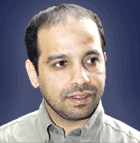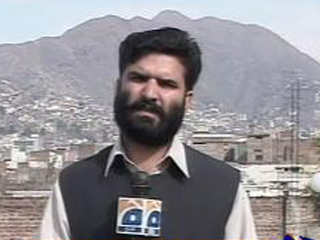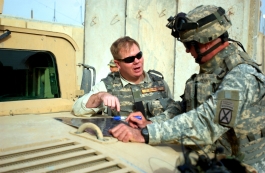Ich habe heute eine Reihe von Texten gelesen, die mich zum Grübeln bringen. So viele, dass ich nocht lange nicht mit dem Grübeln fertig bin. Doch das Gute an diesem Medium hier ist ja, dass man die Begrübelungsgrundlage verbreitern kann, indem man andere dazu einlädt, an de eigenen unfertigen Gedanken teilzuhaben und mitzudenken.
Erstens stach mir dieser Bericht von Press TV ins Auge, in dem behauptet wird, das State Department betrachte sie russische Zusammenarbeit mit den Iranern am Atomkraftwerk Bushehr als im Rahmen des Nichtverbreitungsregimes erlaubte zivile Aktivität. Es wird der Sprecher des Aussenminsiteriums Robert Wood zitiert (den ich noch aus seiner Zeit als Sprecher der Berliner US-Botschaft kenne):
Robert Wood said during a Wednesday press briefing that the trial start-up of the Bushehr nuclear plant in southern Iran is in the realm of peaceful use of nuclear energy.
Und dann wird geschlußfolgert: Wood’s remarks indicated that Washington’s apparent approval was because fuel arrangements for the nuclear facility were made with Russia.
Was bedeuten würde, dass die russische Kooperation mit Iran positiv gesehen wird, weil sie als Argument dazu herhalten kann, dass die Iraner keine eigene Anreicherung brauchen (ausser für Waffenzwecke, was Iran ja zu verfolgen bestreitet).
Das ist doch eine erstaunliche neue Position zu dem ganzen Iran-Russland-Atom-Komplex!
Zweitens las ich einen leidenschaftlichen Text von Roger Cohen in der Herald Tribune, in dem dieser sich wegen eines Reihe von Reportagen aus Iran gegen die Vorwürfe verteidigt, er habe sich von Regime einseifen lassen, was seine milde Sicht des Landes beweise.
Unmittelbarer Anlass für diese Selbstverteidigung: Cohens Äusserungen zur Lage der Juden im Iran, die dort nach seiner Schilderung besser leben als in den meisten arabischen Ländern. (Läßt sich wohl kaum bestreiten.) Nun geht Cohen in die Vollen und wendet sich in seiner neuen Kolumne gegen die Dämonisierung des Iran. Vor allem die dauernden Vergleiche des Iran mit dem Nazi-Staat weist er zurück, und zwar sehr zu Recht:
I was based in Berlin for three years; Germany’s confrontation with the Holocaust inhabited me. Let’s be clear: Iran’s Islamic Republic is no Third Reich redux. Nor is it a totalitarian state.
Munich allowed Hitler’s annexation of the Sudetenland. Iran has not waged an expansionary war in more than two centuries.
Totalitarian regimes require the complete subservience of the individual to the state and tolerate only one party to which all institutions are subordinated. Iran is an un-free society with a keen, intermittently brutal apparatus of repression, but it’s far from meeting these criteria. Significant margins of liberty, even democracy, exist. Anything but mad, the mullahs have proved malleable.
Das ist wichtig, bei aller Kritik an der iranischen Unterdrückung von Regime-Gegnern, Andersgläubigen und Frauen im Sinn zu behalten.
Und drittens beeindruckt mich ein neuer Essay von Fareed Zakaria in Newsweek mit dem Titel „Learning to live with radical Islam“. Zakaria sagt, wir müßten unterscheiden zwischen Islamisten, deren Agenda für die Durchsetzung der Scharia in ihren Gesellschaften wir zwar ablehnen mögen, die unsere Sicherheitsinteressen aber nicht gefährden, und denen, die sich als Teil eines globalen Dschihad gegen den Westen sehen.
In den letzten Jahren haben wir eine Perspektive eingeübt, in der diese Unterscheidung nicht gemacht wurde. Ja, es wurde geradezu zum Dogma, dass es unmöglich sei, zwischen verschiedenen Formen und Graden des Islamismus zu unterscheiden. Am Ende laufe alles aufs Gleiche hinaus.
Wir müssen zur Kenntnis nehmen, dass der radikale Islamismus nicht verschwinden wird und nicht besiegt werden kann, wenn wir alle Islamisten in einen Topf werfen.
Wir müssen neue Prioritäten setzen: Unsere Hauptaufgabe ist es, den Bin-Ladenismus zu besiegen. Und in diesem Kampf sind nicht die moderaten Muslime (oder Ex-Muslime) unsere wichtigsten Verbündeten, sondern diejenigen Radikalen und Fundamentalisten, die sich nicht dem Dschihad gegen uns verschworen haben.
Der „Surge“ im Irak hat aufgrund solcher Teufelspakte funktioniert, und in Afghanistan wird man ähnliche Koalitionen schmieden müssen, auch hier mit Gruppen, die uns zuwider sind. Es geht darum, die lokalen Militanten von den globalen Dschihadis abzuspalten und sie einzubinden in eine Lösung der Probleme des Landes. Zakaria zitiert David Kilcullen, den ich hier vorgestellt habe:
„I’ve had tribal leaders and Afghan government officials at the province and district level tell me that 90 percent of the people we call the Taliban are actually tribal fighters or Pashtun nationalists or people pursuing their own agendas. Less than 10 percent are ideologically aligned with the Quetta Shura [Mullah Omar’s leadership group] or Al Qaeda.“ These people are, in his view, „almost certainly reconcilable under some circumstances.“ Kilcullen adds, „That’s very much what we did in Iraq. We negotiated with 90 percent of the people we were fighting.“
Für unsere einheimische Debatte über Islam und Radikalismus hat das auch Folgen: Wir müssen aufhören, auf Kopftücher und Burkinis zu starren, als sei erst dann Hoffnung in Sicht, wenn diese Markierungen religiöser und kultureller Differenz verschwunden sind.
Es wird ganz einfach nicht passieren, ob es einem passt oder nicht.
Und wir müssen darum auch jede Form der Thematisierung vermeiden, die suggeriert, es gebe ein Kontinuum zwischen Kopftuch und Sprengstoffgürtel.
Zakaria endet mit diesen Worten, die ich nur unterschreiben kann:
We can better pursue our values if we recognize the local and cultural context, and appreciate that people want to find their own balance between freedom and order, liberty and license. In the end, time is on our side. Bin Ladenism has already lost ground in almost every Muslim country. Radical Islam will follow the same path. Wherever it is tried—in Afghanistan, in Iraq, in parts of Nigeria and Pakistan—people weary of its charms very quickly. The truth is that all Islamists, violent or not, lack answers to the problems of the modern world. They do not have a world view that can satisfy the aspirations of modern men and women. We do. That’s the most powerful weapon of all.





